
The Great Pay Divide:
Compensation Trends for 2025
December 12, 2024
Salary raises decreased for the second year in a row, and employees aren’t happy about it—especially women and Baby Boomers
As the cost of living crisis continues to grip the nation—and the economy being a top issue for voters in the recent presidential election—BambooHR’s latest compensation survey sheds light on the stark realities employees face across the United States.
This year's survey of over 1,500 full-time, salaried employees amid these challenging economic conditions reveals a critical juncture in the relationship between compensation and employee satisfaction. In short, for a majority of employees, it’s all about money, money, money.
In this report, we share a comprehensive overview of the current trends in compensation and benefits and the implications for both employees and employers. To effectively navigate the challenges many employees are facing and foster a resilient and satisfied workforce, companies and HR teams need to consider what steps they can take to address these pressing issues.
Key Takeaways
- 72% of employees feel positive emotions when describing their current financial compensation, a drop from 73% in 2023 and 83% in 2022.
- 73% of employees feel like they deserve an increase in pay for their current job responsibilities, but 27% don’t want one if it means more work.
- 64% of men received a salary increase in the past year, compared to 55% of women.
- 47% of employees have discussed their salary amounts with a coworker, 42% just in the last year.
- 50% of employees are currently struggling to make ends meet due to rising costs.
- 61% of Americans say executives and leadership don’t understand the financial struggles of typical employees.
- Over half (55%) of employees think their company’s CEO is overpaid.
- For the second year in a row, 2 in 5 salaried workers haven’t received a salary increase in the past 12 months.
- Of those who received a salary increase, the average increase was 3.6%.
- Nearly 1 in 3 employees (32%) were dissatisfied with their most recent salary increase, up from last year (23%).
- 44% of employees say they’d like to change jobs, but because their salary is secure, they’re staying put.
- 52% of employees would rather have a higher salary than equity, bonuses, or profit sharing.
Average Salary Increase Hovers Just Above Inflation Rate
With annualized inflation lingering at 2.4% and our data showing the average salary increase for 2024 just a little higher at 3.6%, the financial strain is palpable—50% of employees struggle to make ends meet and 43% are working more hours than ever.
The stakes have never been higher, as many employees find themselves grappling with stagnant wages and escalating debts. Our study found that over half of the workforce is burdened by financial obligations that are increasingly difficult to manage, including 60% of US workers who are paying off debt, costing them an average of 30% of their paycheck.
Moreover, 36% of employees report a direct correlation between their compensation and their mental health, and only 41% of employees feel that their current pay is sufficient to sustain their lifestyle.
This underscores the profound impact of financial stress and emphasizes the need for companies to prioritize the wellbeing of their employees over short-term financial gains, according to the principle of "people over profit," which is crucial for sustainable growth and employee loyalty.
Workers’ desires for financial stability reflect this sentiment: three-quarters of employees (76%) believe that no matter the state of the economy, compensation shouldn’t be decreased.
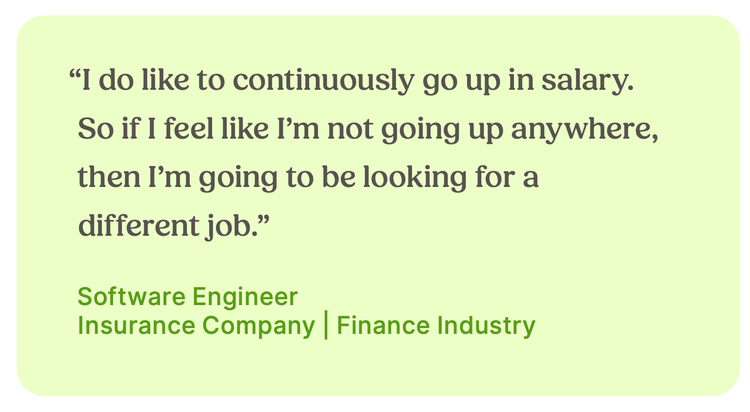
"Companies should consider their employees’ financial wellness when they look at total compensation. At BambooHR, we recognize the importance of financial literacy, which is why we offer our employees a free subscription to a financial literacy program. This program empowers our team with the knowledge and tools they need to manage their finances effectively, providing a sense of security and confidence in uncertain times."
Alex Bertin | Director of Total Rewards | BambooHR
Employee Raises and Compensation Satisfaction Continue to Fall
For the second year in a row, 2 in 5 salaried workers haven't received a salary increase in the last 12 months. For the 60% of employees who did get a raise, the average increase was a modest 3.6%, marking a continued decline from 4.6% in 2023 and 6.2% in 2022—a 42% decrease over two years.
Salary continues to be top of mind for a majority: 52% of employees say they would rather have a higher salary than equity, bonuses, or profit sharing (down from last year’s 60%), evidence that most employees prioritize putting money in their pockets over other benefits that might offer greater monetary value in the long term.
The data also reveals a growing discontent around current compensation structures, with one-third (33%) of employees feeling negatively about their current financial remuneration—a sharp increase from 23% last year.
However, a majority rank themselves as satisfied, with half of employees (50%) saying they were at least somewhat satisfied with their most recent salary increase. This is a drop from last year, where 64% of employees were satisfied with their salary increase.
How satisfied were you with your most recent salary increase?

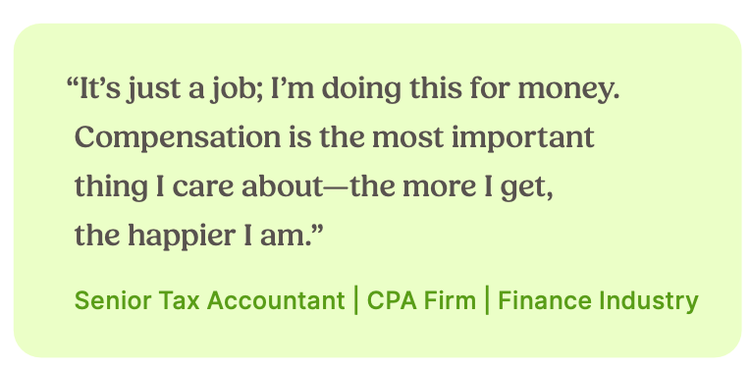
Salary Increases by Industry
Gender Pay Gap Worsens: Women Still Earn Less
Men are more likely to receive raises, they get bigger raises, and they also feel more secure and satisfied regarding their compensation.
Half (50%) of men report that their current salary meets their lifestyle needs, in stark contrast to only 33% of women who feel the same. This discrepancy is consistent with the gender wage gap—on average, women make 16% less than what men make for full-time work, according to the US Department of Labor, as of March 2024.
The sentiment towards financial compensation also varies greatly between genders. Just 27% of men harbor negative feelings about their financial remuneration, compared to 39% of women.
This dissatisfaction among women is compounded by the fact that they are less likely to receive salary increases; 64% of men received a salary increase in the past year, compared to 55% of women. Additionally, the increases that women do receive are typically lower, with men receiving an average increase of 4.8% compared to women's 2.7%.
This trend isn’t new. Our historical data shows that , over the last few years, men have consistently reported receiving higher salary increases than women, with men receiving 4.9% last year and 6.36% in 2022, while women received 3.5% in 2023 and 5.24% in 2022.
The ongoing disparity not only highlights the existing gender pay gap but also indicates that it’s expanding, affecting women's overall satisfaction and financial security. Moving forward, it’ll be crucial for companies to address this gap by ensuring equitable compensation practices that contribute to a fair and motivated workforce.
"The Equal Pay Act requires workers to be given equal pay for equal work, regardless of their gender or identity. Pay inequality also kills culture and morale. Because there are so many tools out there that help business leaders ensure they are being fair in their compensation strategy, there is no excuse for doing otherwise."
Anita Grantham | Head of HR | BambooHR
Gen Z Reports Highest Compensation Satisfaction
As employees progress through different stages of their lives and careers, their expectations and attitudes towards compensation evolve, reflecting broader trends and personal priorities that are part of a multigenerational workforce.
Gen Z, the youngest cohort in the workforce, exhibits a notably positive outlook on their compensation, with 79% expressing satisfaction compared to 70% for Millennials, Gen X, and Baby Boomers.
The optimism among Gen Z workers is also tied to how they perceive the impact of compensation on their mental health, with 45% stating a direct association, compared to 44% of Millennials, 30% of Gen X, and only 22% of Baby Boomers. These figures highlight a growing awareness and concern among younger workers about the mental health implications of financial stability.
Is your compensation directly associated with your
mental health?

Job Mobility by Generation: Millennials Most Likely to Job Hunt
The likelihood of changing jobs also varies significantly across generations.
Millennials are the most active job hunters, with 62% job hunting currently, followed by 54% Gen Z, 48% Gen X, and only 31% of Baby Boomers. This stability among older workers could be attributed to a higher valuation of job security or satisfaction with current roles, which contrasts with younger generations' openness to job mobility—especially considering Baby Boomers are the least satisfied with their most recent salary increase, yet they are also the least likely to be willing to take a new job for a higher salary.
The current job market's challenges have also impacted generational perspectives. Of those not currently looking for a job, a notable 30% of Gen Z workers say it’s because the job market is a mess right now—a sentiment that decreases with age to only 11% of Baby Boomers feeling the same way. This indicates a potential for increased job movement among younger workers once the market conditions improve.
Additionally, the importance of company culture and social opportunities is more pronounced among younger employees.
Social atmosphere is a significant factor in employees’ decision not to pursue other opportunities, especially for Gen Z (44%) compared to 26% of Boomers and 34% of both Gen X and Millennials.

The Hierarchical Divide: Most Employees Think Upper Management Is Out of Touch
The C-suite enjoys the best compensation packages and consequently reports the highest levels of satisfaction. In contrast, individual contributors (ICs) are often the lowest-paid and express greater dissatisfaction with their compensation.
A majority—61%—of Americans perceive that executives and leadership are out of touch with the financial struggles of typical employees. This perception is exacerbated by the attitudes of senior employees towards money, with 56% of individual contributors feeling irked by senior employees' lack of understanding of what it’s like to live on a typical wage.
This makes sense, considering over half (55%) of employees think their company’s CEO is overpaid, though a fourth (27%) admit to not actually knowing what the CEO’s salary is. And compensation can directly translate to how valued employees feel—42% of VP/C-suite workers feel extremely valued by their company, whereas only 12% of individual contributors feel the same.
How valued do you feel by your company?

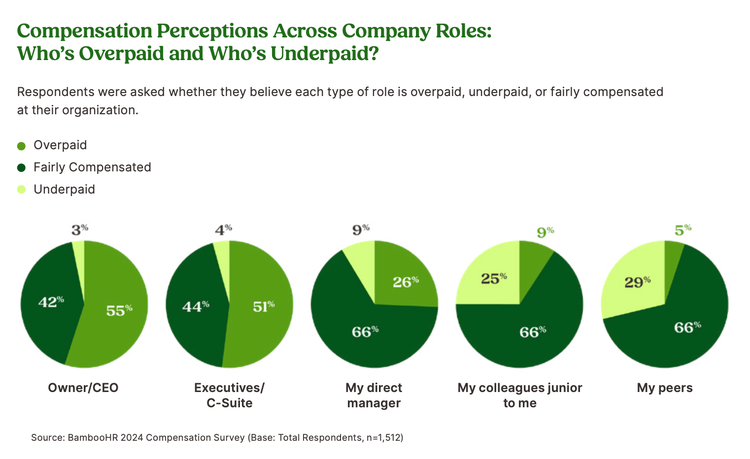
Regardless of who thinks who is overpaid, it’s worth noting that, “From 1978 to 2021, CEO pay based on realized compensation grew by 1,460%. In contrast, compensation of the typical worker grew by just 18.1% from 1978 to 2021,” according to the Economic Policy Institute.
Given these inequalities, it’s unsurprising that 56% of VP/C-suite employees are satisfied with their salary increases over the last 12 months, while only 41% of team leads/managers/directors and 35% of individual contributors feel the same.
The disparity extends to job mobility, with 25% of individual contributors not job hunting currently saying the exhaustion of job searching deters them from considering new opportunities, compared to only 11% of VP/C-suites.
Additionally, 57% of VP/C-suite workers believe their salary meets their lifestyle needs, a sentiment shared by only 39% of individual contributors and 43% of team leads/managers/directors.

Financial Tug-of-War: The Desire to Balance Salary Needs and Job Satisfaction
Employees find themselves in a precarious position where their current salary isn’t enough, driving them to seek new opportunities that promise better compensation.
In fact, the majority (77%) of employees would consider leaving their current positions for higher pay, a sentiment that underscores the critical role salary plays in job satisfaction and career decisions. This is an increase from 73% in 2023 and 2022. Among those 77%, it would take a 12.5% salary increase, on average, for them to consider leaving their current job (down from 13.3% in 2023 and 16.1% in 2022).

For those currently job searching, 23% of employees are willing to accept a salary decrease, 5.4% on average, if it means securing a new position that better aligns with their needs or offers other benefits.
As one employee in the construction industry explains, “I think that as long as the compensation is close to a livable wage, people really value some flexibility and work-life balance. Companies should give more paid time off and more flexibility options to help improve happiness.”
Despite the general desire for higher pay, many employees feel trapped in their current roles due to the security their salary provides—nearly half (47%) of employees admit they would remain in a job they dislike if the pay is high, and 44% are reluctant to leave their secure salary even if they wish to change jobs.
The risk of job searching without a financial safety net further complicates the decision to leave a job, given that 59% of US adults are uncomfortable with their level of emergency savings and 27% have no emergency savings at all, according to Bankrate’s 2024 Annual Emergency Savings Report.
Low Pay, High Turnover: 36% Leave Jobs for Better Compensation
Better compensation remains a driving force for job seekers, with over half (54%) of those actively job hunting over the past 6 months considering leaving their current positions for better pay. Low pay was also a primary reason for many (36%) for leaving their previous job. Almost the same number (35%) of employees cited their mental health as the main reason for leaving their last job.
This dissatisfaction regarding pay and work environment contributes to "quiet quitting," where, according to our data, 51% of employees are actively looking for or considering new job opportunities, yet many remain uncommitted to their current roles.
And employees are closely tracking industry trends and staying alert for new opportunities, with 78% monitoring job listings and pay scales within their field. This vigilance is often motivated by the need to negotiate raises and promotions, as 41% track salary data for this purpose.
Resentment can also brew among employees, with 40% feeling discontent towards colleagues hired at the same time but earning more, and 31% resenting those paid more due to better economic conditions at the time of their hiring.
A Majority of Employees Care About Benefits Beyond Salary
While salary is a primary factor, non-salary compensation also plays a crucial role in job satisfaction. A substantial 85% of employees express a desire for additional benefits not currently offered by their employers. Although 37% prioritize pay over other benefits, 63% would accept a pay cut for specific perks. For instance, 28% would trade a salary increase for a 4-day work week, and 26% for more paid time off.
In the chart below, we take a look at a number of additional benefits employees value:
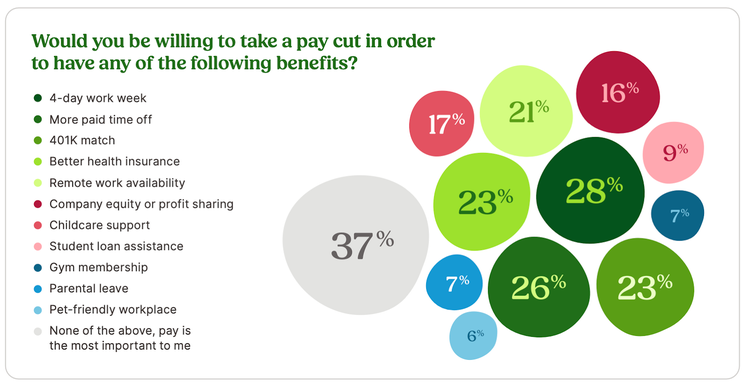
Half of Employees Are Talking about Salary Transparency—Regardless of Policy
When it comes to salary, transparency is a concept that continues to gain traction. Nearly half (47%) of employees have discussed their salary with a coworker, with 42% having done so in the last year.
This trend is more pronounced among younger generations, with 21% of Gen Z workers disclosing their salary to a coworker within the last month, compared to only 4% of Baby Boomers. Notably, 77% of Baby Boomers have never disclosed their salary to a coworker, highlighting generational differences in attitudes towards salary transparency.
Almost Half of Companies Don’t Practice Pay Transparency
Regarding organizational policy, 42% of salaried workers report their company doesn’t practice salary transparency, with only 52% acknowledging some limited transparency. Only 12% of employees say their company encourages discussions about compensation with coworkers, down from 17% in 2023.
Conversely, 54% report their company discourages such discussions, up from 46% in 2023. This lack of openness is further highlighted by the fact that 51% of employees feel that published salary bands are insufficient for true pay transparency, and 21% do not discuss their compensation with HR or managers at all.
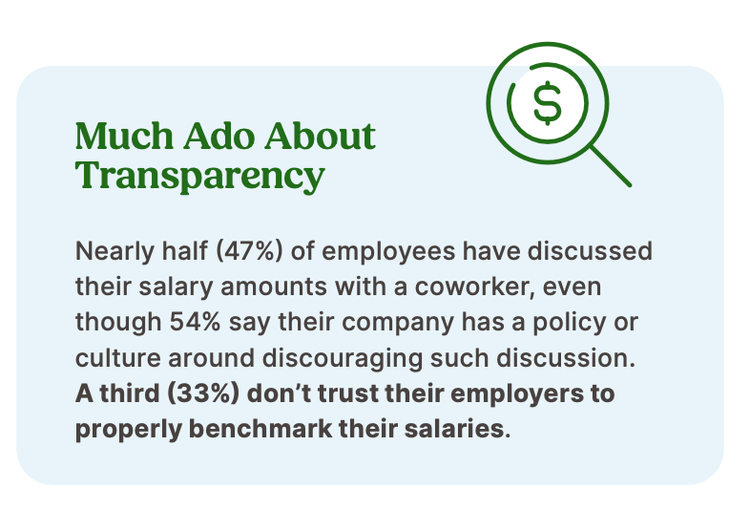
50% of Employees Say Pay Transparency Improves Equality
Pay transparency is recognized as a best practice that promotes equitable compensation practices. However, it remains a sensitive issue that HR professionals must navigate conscientiously.
Employees have different definitions of salary transparency:
- 25% believe it involves clearly communicating total compensation to each employee
- 35% think it means disclosing salary ranges for every role
- 21% see it as revealing the exact salary of every role
While definitions vary, nearly half of all employees (44%) agree that salary transparency increases overall trust in the organization, and 36% say it enhances accountability for leadership.
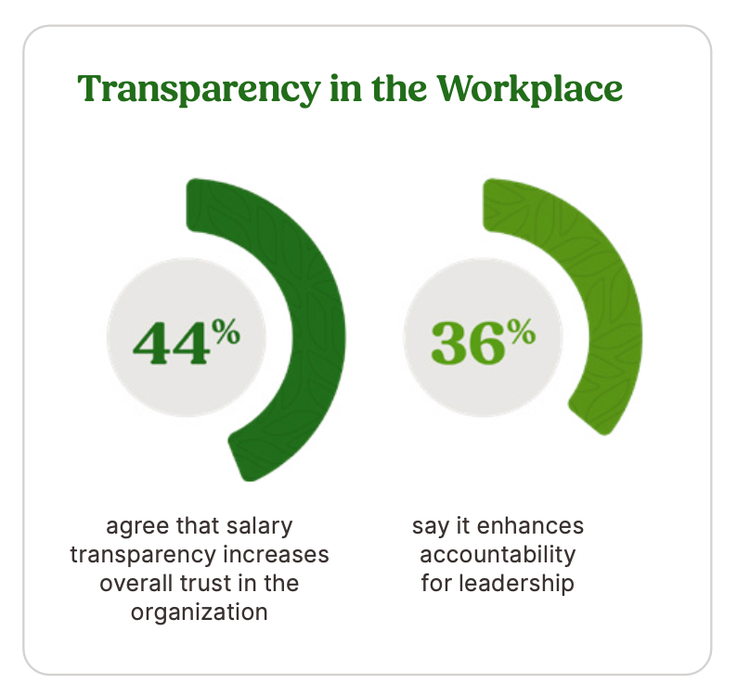
Why does it matter?
This openness not only holds leadership accountable but also underscores the importance of ensuring equal pay for equal work.
Half (50%) of employees believe that salary transparency ensures equal pay for equal work. Additionally, 43% see it as a means to reduce pay discrimination, and nearly 1 in 4 (23%) believe it can highlight disparities in salaries caused by market factors.
Employees’ strong sense of community and fairness extends to pay cuts, too 38% of full-time employees would even forgo a raise to keep their coworkers safe from layoffs.
However, pay transparency can also present challenges. Over half of employees (53%) feel it can foster jealousy, and 47% believe it may lead to increased gossip and employee discourse. Additionally, 36% of employees are concerned about its potential negative impact on company culture.
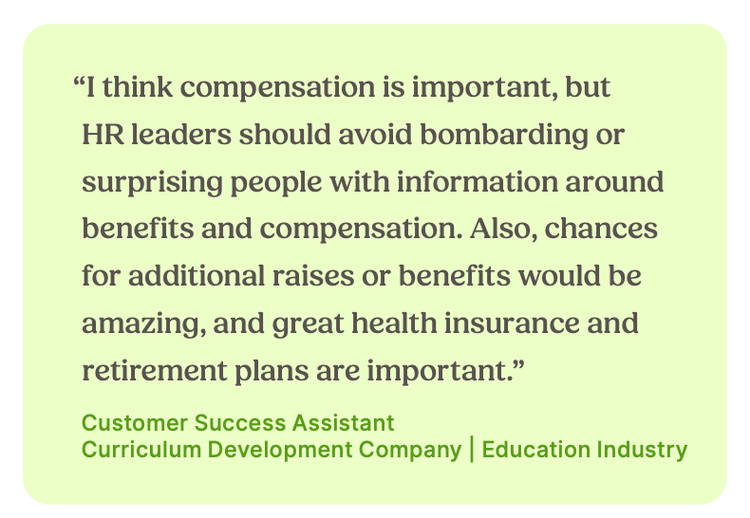
Money Matters: Next Steps for Organizations and HR Teams
In a challenging economy, business leaders are tasked with supporting their employees effectively. This involves not only managing resources wisely but also maintaining transparency and fairness in compensation practices.
Here are some detailed strategies based on what we’ve seen in the data:
- Promote Salary Transparency: Foster an environment where salary discussions are open and encouraged. This transparency helps build trust, ensure equal pay for equal work, and reduce pay discrimination.
- Implement Clear Policies: Develop and communicate clear policies regarding compensation, especially if there are differentials based on location or role. This clarity can prevent misunderstandings and contribute to a more open company culture.
- Consider Cost of Living Adjustments: For employees in different geographic locations, consider implementing cost of living adjustments to ensure fairness and employee satisfaction across the board.
- Enhance Benefits and Compensation Packages: If salary increases aren’t feasible, consider improving the overall compensation package with benefits valued by employees, such as flexible work options or additional paid time off.
- Establish Regular Compensation Reviews: Conduct regular reviews of compensation packages to ensure they remain competitive and reflect the market standards, employee contributions, and responsibilities.
- Educate Employees on Compensation Structures: Help employees understand how their compensation is determined, including the differences between merit-based and market-based increases, to minimize potential confusion and dissatisfaction.
- Monitor Industry Trends: Stay up to date on industry salary trends to ensure that your compensation packages are competitive enough to attract and retain top talent. Consider an HR platform to store and manage employee data and access easily.
- Address Employee Concerns: Actively listen to and address employee concerns regarding compensation to maintain morale and productivity. For example, conducting regular, anonymous surveys can help employees feel heard.
By implementing key strategies, companies can create a fair and transparent compensation system that not only supports employee satisfaction but also drives organizational success.
"In today's economic climate, if raises aren't possible, it's vital to focus on total rewards, which is compensation plus the total investment a business makes in an employee each year in additional benefits like health insurance. Also look at enhancing benefits such as flexible work arrangements, professional development, and wellness programs. Recognizing achievements and offering equity options can also boost morale. These strategies help maintain employee satisfaction and engagement, even when salary increases are off the table."
Anita Grantham | Head of HR | BambooHR
Methodology
About BambooHR
BambooHR is the leading HR software solution that sets people free to do great work, by managing the complex work of supporting employees and succeeding as a business, while giving leaders all the data they need to make informed strategic decisions.
Intuitively designed and easy-to-use benefits administration, payroll, performance, time tracking, and reporting where everything works together means less focus on process and more focus on growing what matters most—people.
Over the past 15 years, BambooHR has been the trusted partner of HR professionals at 33,000 companies with employees in over 190 countries and 50 industries, supporting millions of users throughout their employee experience.
The New Surveillance Era: Visibility Beats Productivity for RTO & Remote
What exactly is the Green Status Effect, and who are more productive, remote or in-office workers? Check out the 2024 report to find out.
Spotlight on Q3: The Unexpected Rebound in Employee Happiness
Read the Q3 2024 report to see the latest in employee satisfaction across industries.
Compensation Trends for 2024: Deflation, Transparency, and Benefits
24% of workers say they’d be willing to take a salary cut if it meant job security for the next year. Click below to understand how workers are feeling and why.